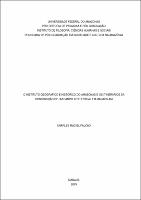| ???jsp.display-item.social.title??? |


|
Please use this identifier to cite or link to this item:
https://tede.ufam.edu.br/handle/tede/7511| ???metadata.dc.type???: | Tese |
| Title: | O Instituto Geográfico e Histórico do Amazonas e os itinerários da construção de um campo intelectual em Manaus-AM |
| ???metadata.dc.creator???: | Falcão, Charles Maciel  |
| ???metadata.dc.contributor.advisor1???: | Pinto, Ernesto Renan Melo de Freitas |
| ???metadata.dc.contributor.referee1???: | Ferreira, Lúcia Marina Puga |
| ???metadata.dc.contributor.referee2???: | Pinto, Marilina Conceição Oliveira Bessa Serra |
| ???metadata.dc.contributor.referee3???: | Rodrigues, Allan Soljenítsin Barreto |
| ???metadata.dc.contributor.referee4???: | Silva, Jackson Colares da |
| ???metadata.dc.description.resumo???: | Compreender o processo de constituição de um campo intelectual, no cenário cultural da Manaus do início do século XX, é uma tarefa que exige o esforço por perceber as conexões entre o universo intelectual e a esfera política, entendida enquanto campo do poder. Exemplo dessa conexão, a fundação do Instituto Geográfico e Histórico do Amazonas (IGHA), representa a iniciativa de um grupo de intelectuais que, num contexto de dificuldades para a permanência de instituições de caráter científico-cultural, ousaram fundar uma entidade com intenções claras de pensar acerca da realidade e propor caminhos possíveis ao momento de crise econômica verificado naqueles anos da década de 1910. Surgindo na paisagem cultural de Manaus em 1917, o IGHA passa a congregar intelectuais e personalidades de outras esferas sociais da realidade propondo, dentre outras atividades, a edição de uma revista para a publicação dos trabalhos de seus associados. Seguindo o modelo pioneiro do Instituto Histórico e Geográfico Brasileiro (IHGB), fundado em 1938 no Rio de Janeiro, o IGHA trilhará um caminho de proximidade com o campo político, no sentido de lançar mão do volume de capital de relações acumulado por seus associados para, em seguida, se constituir como um lugar de fala reconhecido e capaz de reconhecer posições internamente assumidas pelos fundadores e sócios efetivos. A partir da conexão entre os trâmites internos de estabelecimento de um modus operandi e de um habitus orientador de condutas e as pressões oriundas da ordem social mais ampla, sobretudo do mundo político-econômico, o trabalho buscou perceber as intenções em jogo na fundação do Instituto, as redes de relações estabelecidas ao longo de sua história e o papel que ele assumiu no processo de desenvolvimento de um campo intelectual relativamente autônomo na cidade de Manaus e no Amazonas, desde a sua fundação até a década de 1950. |
| Abstract: | Understanding the process of constituting an intellectual field in the cultural scene of Manaus in the early twentieth century is a task that requires the effort to understand the connections between the intellectual universe and the political sphere, understood as a field of power. An example of this connection, the founding of the Amazonas Geographical and Historical Institute (IGHA) represents the initiative of a group of intellectuals who, in a context of difficulties for the permanence of scientific and cultural institutions, dared to found an entity with clear intentions of think about reality and propose possible paths to the moment of economic crisis verified in those years of the 1910s. Appearing in the cultural landscape of Manaus in 1917, IGHA now brings together intellectuals and personalities from other social spheres of reality, proposing, among other activities, the edition of a magazine for the publication of the work of its associates. Following the pioneering model of the Brazilian Historical and Geographic Institute (IHGB), founded in 1938 in Rio de Janeiro, IGHA will follow a path of proximity with the political field, in order to make use of the volume of relationship capital accumulated by its members to It is then constituted as a recognized place of speech capable of recognizing positions internally taken by the founders and effective partners. From the connection between the internal procedures of establishing a modus operandi and a conductor-oriented habitus and the pressures from the broader social order, especially from the political-economic world, the work sought to understand the intentions at stake in the founding of the Institute. , the networks of relationships established throughout its history and the role it has assumed in the process of developing a relatively autonomous intellectual field in the city of Manaus and the Amazon. |
| Keywords: | Instituto Geográfico e Histórico do Amazonas Vida intelectual - Manaus - Século XX Cultura - Manaus - Século XX |
| ???metadata.dc.subject.cnpq???: | CIÊNCIAS HUMANAS |
| ???metadata.dc.subject.user???: | Campo intelectual Campo cultural Institutos históricos |
| Language: | por |
| ???metadata.dc.publisher.country???: | Brasil |
| Publisher: | Universidade Federal do Amazonas |
| ???metadata.dc.publisher.initials???: | UFAM |
| ???metadata.dc.publisher.department???: | Instituto de Filosofia, Ciências Humanas e Sociais |
| ???metadata.dc.publisher.program???: | Programa de Pós-graduação em Sociedade e Cultura na Amazônia |
| Citation: | FALCÃO, Charles Maciel. O Instituto Geográfico e Histórico do Amazonas e os itinerários da construção de um campo intelectual em Manaus-AM. 2019. 269 f. Tese (Doutorado em Sociedade e Cultura na Amazônia) - Universidade Federal do Amazonas, Manaus, 2019. |
| ???metadata.dc.rights???: | Acesso Aberto |
| ???metadata.dc.rights.uri???: | http://creativecommons.org/licenses/by/4.0/ |
| URI: | https://tede.ufam.edu.br/handle/tede/7511 |
| Issue Date: | 2-Aug-2019 |
| Appears in Collections: | Doutorado em Sociedade e Cultura na Amazônia |
Files in This Item:
| File | Description | Size | Format | |
|---|---|---|---|---|
| Tese_CharlesFalcão_PPGSCA.pdf | 5.98 MB | Adobe PDF |  Download/Open Preview |
This item is licensed under a Creative Commons License





